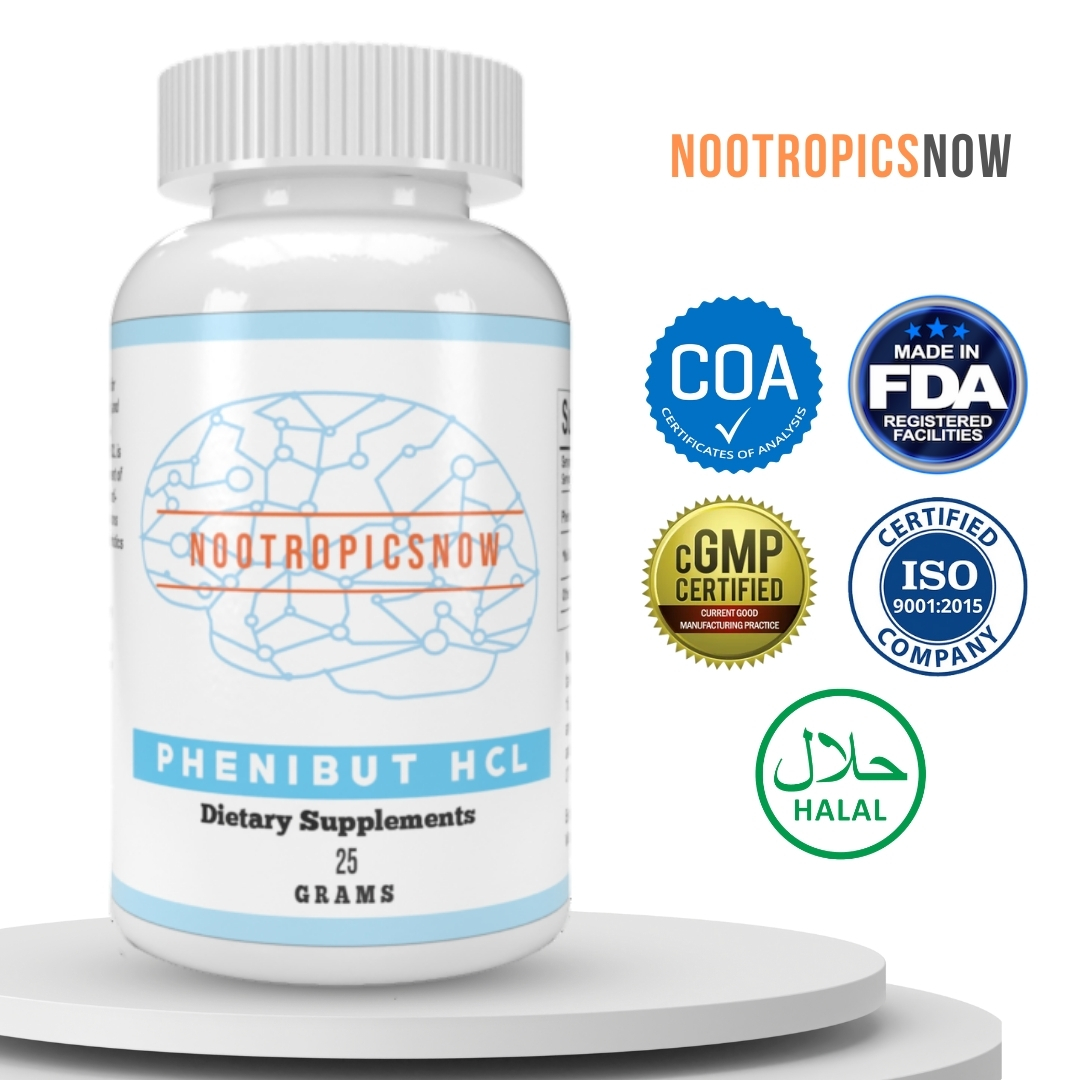Phenibut HCL: Uses, Dosage & Side Effects

`markdown
Phenibut HCl: Unveiling the Nootropic for Anxiety Relief and Cognitive Enhancement
Phenibut HCl, or β-phenyl-γ-aminobutyric acid hydrochloride, is a synthetic derivative of the naturally occurring inhibitory neurotransmitter GABA (gamma-aminobutyric acid). Consequently, this nootropic compound has garnered significant attention due to its anxiolytic (anti-anxiety), nootropic (cognitive enhancing), and sedative properties. Consequently, understanding phenibut HCl involves exploring its mechanisms, benefits, potential risks, and appropriate usage guidelines.
What is Phenibut HCl?
Essentially, phenibut HCl is GABA with an added phenyl ring. This addition allows the molecule to cross the blood-brain barrier more easily than GABA alone, thereby exerting more pronounced effects on the central nervous system. Developed in Russia in the 1960s, it’s been used clinically to treat a range of conditions, primarily anxiety and insomnia. Therefore, individuals seek it for its potential to improve mood, reduce social anxiety, and promote relaxation.
Key Features of Phenibut HCl
How Phenibut HCl Works: Mechanisms of Action
Phenibut’s effects stem from its interaction with the GABA system. GABA is the primary inhibitory neurotransmitter in the brain, playing a crucial role in regulating neuronal excitability.
GABA(B) Receptor Agonism
Primarily, phenibut acts as an agonist at the GABA(B) receptors. GABA(B) receptors are metabotropic receptors, meaning they trigger a cascade of intracellular events when activated. These receptors are widely distributed throughout the brain and influence various processes, including:
GABA(A) Receptor Binding
Although less pronounced than its GABA(B) activity, phenibut can also bind to GABA(A) receptors. GABA(A) receptors are ionotropic receptors, meaning they directly open chloride channels when activated. Activation of GABA(A) receptors leads to:
Dopamine Release Modulation
Some evidence suggests that phenibut can modulate dopamine release, particularly at higher doses. Dopamine is a neurotransmitter associated with pleasure, motivation, and reward. This dopaminergic effect can contribute to:
The Benefits of Phenibut HCl: What Users Report
While research is ongoing, many users report a variety of benefits from phenibut HCl supplementation. However, it’s important to note that individual experiences can vary, and these benefits are not universally experienced.
Anxiety Relief and Stress Reduction
This is the most commonly cited benefit of phenibut. Users describe a significant reduction in social anxiety, generalized anxiety, and stress levels. This can lead to:
Improved Sleep Quality
Many users find that phenibut promotes relaxation and facilitates sleep, particularly those who struggle with anxiety-induced insomnia. It can lead to:
Cognitive Enhancement
Some users report improved cognitive function, including:
However, these cognitive benefits are less consistently reported than the anxiolytic and sedative effects.
Mood Enhancement
Phenibut can elevate mood and promote a sense of well-being. This can be attributed to its effects on both GABA and dopamine. It can lead to:
Muscle Relaxation
Phenibut’s GABAergic activity can promote muscle relaxation, potentially beneficial for those with muscle tension or spasms.
Dosage and Usage Guidelines
Proper dosage is crucial for maximizing benefits and minimizing risks associated with phenibut HCl. It’s also critical to cycle usage as dependence can form quickly.
Starting Dose
Dosage Range
Frequency of Use
Timing
Cycling
Potential Risks and Side Effects
Despite its potential benefits, phenibut HCl is associated with a number of risks and side effects, particularly with improper use.
Tolerance and Dependence
Withdrawal Symptoms
Phenibut withdrawal can be severe and potentially dangerous. Symptoms can include:
Withdrawal symptoms can last for several days or even weeks. Medical supervision is recommended for detoxification.
Other Side Effects
Other potential side effects of phenibut HCl include:
Interactions
Phenibut can interact with other substances, including:
Legal Status and Availability
The legal status of phenibut HCl varies depending on the country.
Due to its variable legal status, it is crucial to understand local regulations before purchasing or using phenibut HCl.
Finding Reputable Sources for Phenibut HCl
Given its potential risks, it is important to source phenibut HCl from reputable suppliers. Look for:
Online Vendors
Several online vendors sell phenibut HCl. Research these thoroughly before making a purchase. Check forums like Reddit for user experiences.

View Product

View Product
Local Supplement Stores
Some local supplement stores may carry phenibut HCl. Inquire about the source and quality of their products.
Alternatives to Phenibut HCl
Due to its risks, exploring alternatives to phenibut HCl is worthwhile. Several safer options can provide similar benefits, albeit often to a lesser extent.
L-Theanine
An amino acid found in tea, L-theanine promotes relaxation without sedation. It can reduce anxiety and improve focus.

View Product

View Product
Magnesium
Magnesium is a mineral that plays a role in nerve function and muscle relaxation. Magnesium deficiency can contribute to anxiety and insomnia.
Ashwagandha
An adaptogenic herb, ashwagandha can reduce stress, improve mood, and enhance cognitive function.

View Product
Lemon Balm
Lemon balm is an herb with calming properties. It can reduce anxiety and improve sleep.
GABA Supplements
While GABA itself doesn’t readily cross the blood-brain barrier, some GABA supplements are claimed to have anxiolytic effects.
The Future of Phenibut HCl Research
Research into phenibut HCl continues, focusing on its potential therapeutic applications and mechanisms of action.
Clinical Trials
Further clinical trials are needed to fully evaluate the efficacy of phenibut HCl for various conditions, particularly anxiety and insomnia.
Mechanisms of Action Studies
Research into how phenibut interacts with the GABA system and other neurotransmitter systems is ongoing.
Addiction and Withdrawal Research
Studies are needed to better understand the mechanisms of tolerance, dependence, and withdrawal associated with phenibut HCl.
Conclusion: Is Phenibut HCl Right for You?
Phenibut HCl is a complex compound with both potential benefits and significant risks. Its anxiolytic, nootropic, and sedative properties can be appealing to those seeking relief from anxiety, insomnia, or cognitive impairment. However, its addictive potential and severe withdrawal symptoms necessitate caution. Therefore, individuals should:
Ultimately, the decision to use phenibut HCl is a personal one that should be made in consultation with a healthcare provider, considering individual circumstances and risk tolerance. Responsible and informed use is essential to mitigate potential harms.
`
Phenibut HCl: Uses, Effects, and Risks
Phenibut HCl (β-phenyl-γ-aminobutyric acid HCl) is a derivative of the naturally occurring inhibitory neurotransmitter GABA (gamma-aminobutyric acid). Introduced in Russia during the 1960s, it gained popularity for its anxiolytic (anxiety-reducing) and nootropic (cognitive-enhancing) effects. However, its unregulated status in many countries and potential for dependence necessitate a thorough understanding of its properties and risks.
Mechanism of Action: How Phenibut Works
Phenibut HCl primarily works by mimicking the effects of GABA in the brain. Specifically, it binds to GABAB receptors, which are G protein-coupled receptors that inhibit neuronal activity. This binding results in a calming effect, reducing anxiety and promoting relaxation. The phenyl ring in phenibut’s structure allows it to cross the blood-brain barrier more easily than GABA itself. This greater penetration into the brain contributes to its pronounced effects.
In addition to GABAB receptor agonism, phenibut also exhibits some activity at GABAA receptors, although to a lesser extent. Furthermore, it may indirectly influence dopamine levels in the brain. This dopaminergic effect can contribute to the feelings of euphoria and motivation sometimes reported by users. However, this dopamine interaction also plays a significant role in its addictive potential.
`markdown

View Product
`
`markdown

View Product
`
Therapeutic Applications: Approved and Off-Label Uses
Phenibut HCl is clinically approved in Russia for a variety of conditions. These include anxiety disorders, insomnia, and post-traumatic stress disorder (PTSD). Doctors also prescribe it for the treatment of asthenia (weakness or lack of energy), depression, and alcohol withdrawal syndrome. Furthermore, it’s used to manage vestibular disorders (problems with balance), such as Ménière’s disease and dizziness.
However, outside of Russia and some Eastern European countries, phenibut HCl is not an approved medication. Therefore, its use in other countries is considered “off-label.” Despite this, it is often used by individuals self-treating anxiety, insomnia, and other related conditions due to its availability as a dietary supplement or research chemical. This self-medication carries significant risks, especially regarding dosage and potential for dependence.
Potential Benefits of Phenibut HCl
When used responsibly and under medical supervision (where legally permissible), phenibut HCl can offer several potential benefits.
Side Effects and Risks Associated with Phenibut
Despite its potential benefits, phenibut HCl carries significant risks and side effects, especially with irresponsible use. Understanding these risks is crucial before considering its use.
Dosage Guidelines and Safety Considerations
Due to its potential risks, using phenibut HCl requires extreme caution and careful consideration. The following guidelines are essential for safe use:
Legal Status and Regulation
The legal status of phenibut HCl varies widely across different countries. In the United States, it is not an approved drug but is often sold as a dietary supplement. This means it is not subject to the same regulations as prescription medications.
In some countries, such as Australia and Hungary, phenibut is a controlled substance due to concerns about its potential for abuse and addiction. This means that possession and sale of phenibut may be illegal without a prescription.
It is essential to be aware of the legal status of phenibut in your country before considering its use.
Phenibut Alternatives: Safer Options for Anxiety and Sleep
Given the risks associated with phenibut HCl, exploring safer and more sustainable alternatives for managing anxiety and sleep problems is prudent. Several natural and pharmaceutical options can provide similar benefits with a lower risk profile.
`markdown

View Product
`
The Role of Research and Future Directions
Further research is needed to fully understand the mechanisms of action and long-term effects of phenibut HCl. This research should focus on:
This research will help to inform clinical guidelines and regulatory decisions regarding the use of phenibut.
Conclusion: Weighing the Risks and Benefits
Phenibut HCl is a complex compound with the potential for both therapeutic benefits and significant risks. While it may offer relief from anxiety, insomnia, and other conditions, its addictive potential and severe withdrawal symptoms necessitate extreme caution.
The unregulated status of phenibut in many countries makes it readily accessible, but this also means that users are often self-treating without medical supervision. Responsible use requires careful consideration of dosage, frequency, and potential drug interactions.
Ultimately, the decision to use phenibut HCl should be made in consultation with a healthcare professional, and only after carefully weighing the potential risks and benefits. Exploring safer and more sustainable alternatives is often a more prudent approach to managing anxiety and sleep problems. As with any medication or supplement, informed decision-making and responsible use are paramount.

